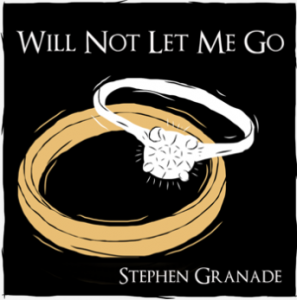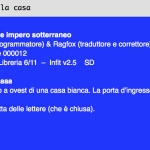
Scritta da Stephen Granade, veterano della narrativa interattiva, questa storia mi ha ricordato la leggendaria Photopia di Adam Cadre: per le emozioni che suscita, la scrittura evocativa, la profondità.
Stephen, in una sola riga di presentazione, spiega subito tutto (non ha bisogno di colpi di scena): è la storia di un uomo che si ammala di Alzheimer a poco più di sessant’anni.
Nella prima scena, siamo a un funerale e l’autore ci fa subito conoscere Fred in modo struggente. Poi, torniamo indietro, ritroviamo Fred nelle recenti fasi della sua vita, quando scopre di avere la malattia. Se ne accorge gradualmente, e noi con lui; fatica ad accettarlo, e noi con lui.
E’ magistrale il modo in cui Stephen Granade ha usato Twine: le parole da “cliccare” a volte cambiano perché Fred fatica a ricordare, altre parole rimangono monche… Uno straordinario viaggio nella memoria, un’opera meravigliosa. Se proprio dobbiamo trovare un difetto, forse è un po’ prolissa in certi passaggi, ma siamo dalle parti del capolavoro, e bastano le prime due righe della storia per rendersi conto del valore di Will Not Let Me Go:
You can leave off reading the story and then come back to it later
The story will remember where you were
Remember
Written by Stephen Granade, a veteran of interactive fiction, this story reminded me of Adam Cadre’s legendary Photopia: for the emotions it raises, the evocative writing, and the depth.
Stephen introduces his game with a single line and immediately explains everything (he doesn’t need twists): it’s the story of a man who gets Alzheimer’s disease just over sixty.
In the opening scene, we are at a funeral, and the author immediately introduces Fred in a moving way. Then, we go back and find Fred in recent stages of his life when he discovers he has the disease. He gradually realizes what’s happening, and we with him; he struggles to accept it, and we with him.
The way Stephen Granade used Twine is great: the words sometimes change because Fred struggles to remember, other words are cut … An extraordinary journey into memory, a wonderful work. If we really have to find a con, maybe some passages are too long, but Will Not Let Me Go is just short of a masterpiece. And that’s clear from the first lines…
You can leave off reading the story and then come back to it later
The story will remember where you were
Remember


